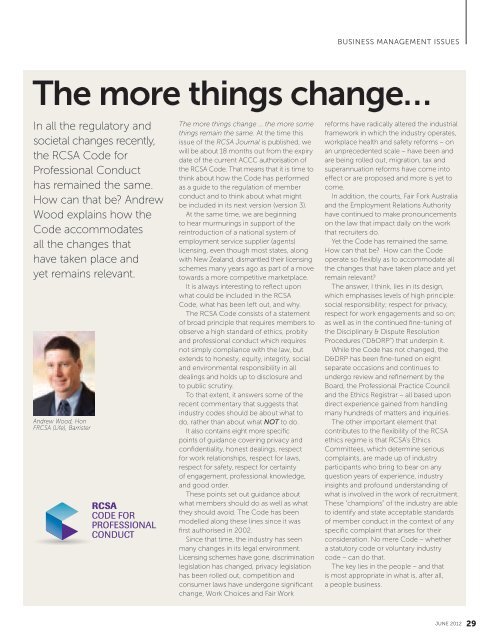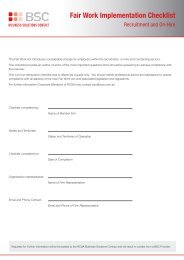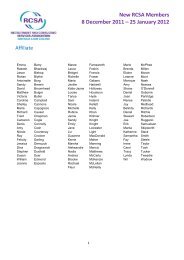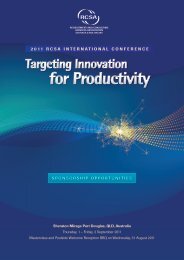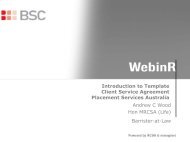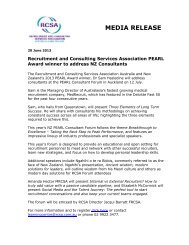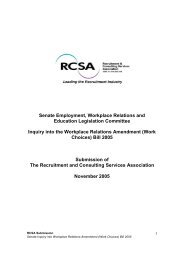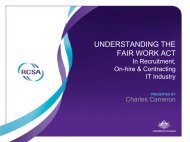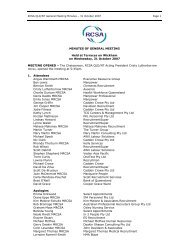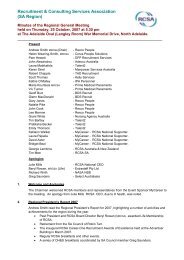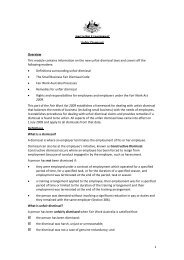June 2012.pdf - RCSA
June 2012.pdf - RCSA
June 2012.pdf - RCSA
You also want an ePaper? Increase the reach of your titles
YUMPU automatically turns print PDFs into web optimized ePapers that Google loves.
BUSINESS MANAGEMENT ISSUES<br />
The more things change…<br />
In all the regulatory and<br />
societal changes recently,<br />
the <strong>RCSA</strong> Code for<br />
Professional Conduct<br />
has remained the same.<br />
How can that be Andrew<br />
Wood explains how the<br />
Code accommodates<br />
all the changes that<br />
have taken place and<br />
yet remains relevant.<br />
Andrew Wood, Hon<br />
F<strong>RCSA</strong> (Life), Barrister<br />
The more things change … the more some<br />
things remain the same. At the time this<br />
issue of the <strong>RCSA</strong> Journal is published, we<br />
will be about 18 months out from the expiry<br />
date of the current ACCC authorisation of<br />
the <strong>RCSA</strong> Code. That means that it is time to<br />
think about how the Code has performed<br />
as a guide to the regulation of member<br />
conduct and to think about what might<br />
be included in its next version (version 3).<br />
At the same time, we are beginning<br />
to hear murmurings in support of the<br />
reintroduction of a national system of<br />
employment service supplier (agents)<br />
licensing, even though most states, along<br />
with New Zealand, dismantled their licensing<br />
schemes many years ago as part of a move<br />
towards a more competitive marketplace.<br />
It is always interesting to reflect upon<br />
what could be included in the <strong>RCSA</strong><br />
Code, what has been left out, and why.<br />
The <strong>RCSA</strong> Code consists of a statement<br />
of broad principle that requires members to<br />
observe a high standard of ethics, probity<br />
and professional conduct which requires<br />
not simply compliance with the law, but<br />
extends to honesty, equity, integrity, social<br />
and environmental responsibility in all<br />
dealings and holds up to disclosure and<br />
to public scrutiny.<br />
To that extent, it answers some of the<br />
recent commentary that suggests that<br />
industry codes should be about what to<br />
do, rather than about what NOT to do.<br />
It also contains eight more specific<br />
points of guidance covering privacy and<br />
confidentiality, honest dealings, respect<br />
for work relationships, respect for laws,<br />
respect for safety, respect for certainty<br />
of engagement, professional knowledge,<br />
and good order.<br />
These points set out guidance about<br />
what members should do as well as what<br />
they should avoid. The Code has been<br />
modelled along these lines since it was<br />
first authorised in 2002.<br />
Since that time, the industry has seen<br />
many changes in its legal environment.<br />
Licensing schemes have gone, discrimination<br />
legislation has changed, privacy legislation<br />
has been rolled out, competition and<br />
consumer laws have undergone significant<br />
change, Work Choices and Fair Work<br />
reforms have radically altered the industrial<br />
framework in which the industry operates,<br />
workplace health and safety reforms – on<br />
an unprecedented scale – have been and<br />
are being rolled out, migration, tax and<br />
superannuation reforms have come into<br />
effect or are proposed and more is yet to<br />
come.<br />
In addition, the courts, Fair Fork Australia<br />
and the Employment Relations Authority<br />
have continued to make pronouncements<br />
on the law that impact daily on the work<br />
that recruiters do.<br />
Yet the Code has remained the same.<br />
How can that be How can the Code<br />
operate so flexibly as to accommodate all<br />
the changes that have taken place and yet<br />
remain relevant<br />
The answer, I think, lies in its design,<br />
which emphasises levels of high principle:<br />
social responsibility; respect for privacy,<br />
respect for work engagements and so on;<br />
as well as in the continued fine-tuning of<br />
the Disciplinary & Dispute Resolution<br />
Procedures (“D&DRP”) that underpin it.<br />
While the Code has not changed, the<br />
D&DRP has been fine-tuned on eight<br />
separate occasions and continues to<br />
undergo review and refinement by the<br />
Board, the Professional Practice Council<br />
and the Ethics Registrar – all based upon<br />
direct experience gained from handling<br />
many hundreds of matters and inquiries.<br />
The other important element that<br />
contributes to the flexibility of the <strong>RCSA</strong><br />
ethics regime is that <strong>RCSA</strong>’s Ethics<br />
Committees, which determine serious<br />
complaints, are made up of industry<br />
participants who bring to bear on any<br />
question years of experience, industry<br />
insights and profound understanding of<br />
what is involved in the work of recruitment.<br />
These “champions” of the industry are able<br />
to identify and state acceptable standards<br />
of member conduct in the context of any<br />
specific complaint that arises for their<br />
consideration. No mere Code – whether<br />
a statutory code or voluntary industry<br />
code – can do that.<br />
The key lies in the people – and that<br />
is most appropriate in what is, after all,<br />
a people business.<br />
JUNE 2012 29


